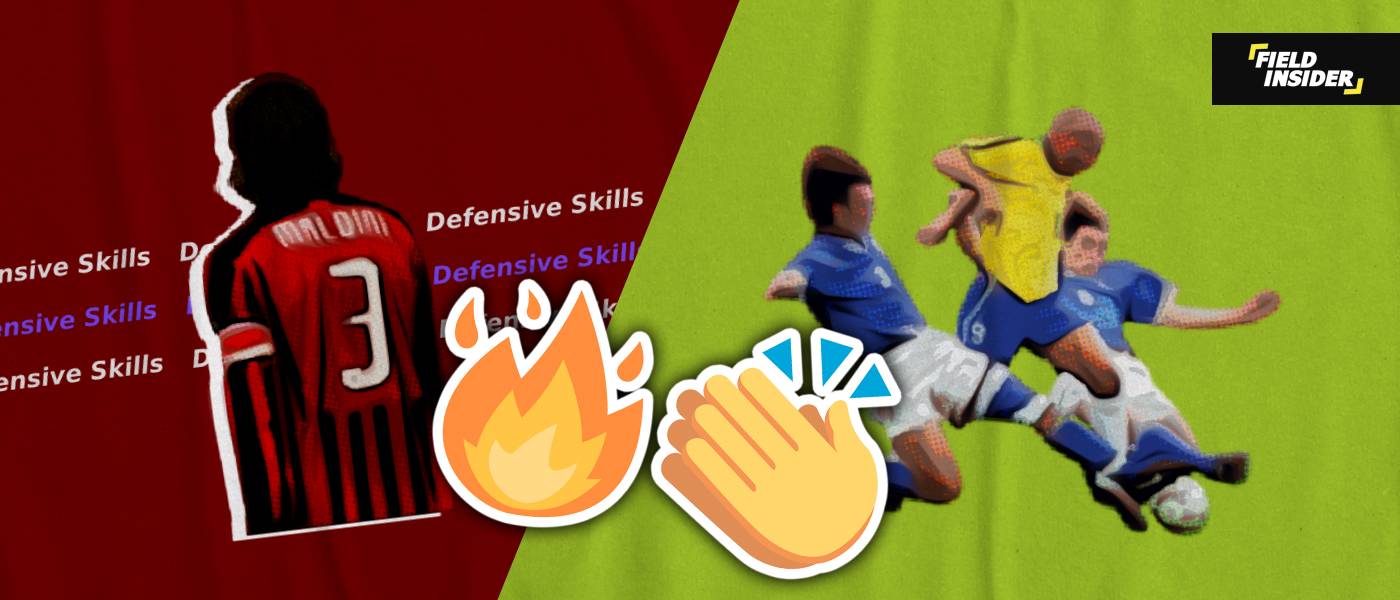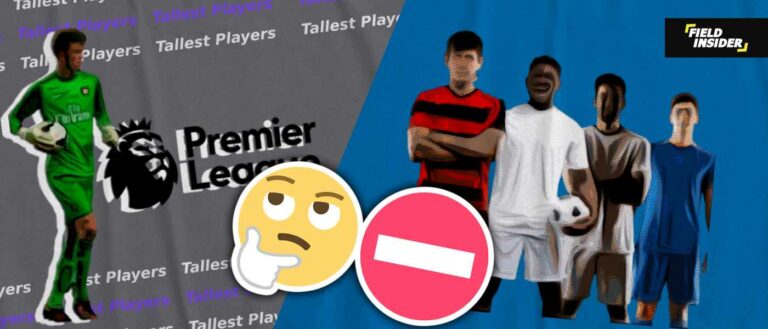How To Become a Defender In Soccer: Complete Guide
In the dynamic world of sports, the defender plays a pivotal role, often being the backbone of a team. Their importance cannot be overstated, whether in football, basketball, hockey, or any team sport involving defense.
This article aims to provide a comprehensive guide to becoming a successful defender, balancing professional insight with straightforward, informative content.
Key Takeaways
| Main Topic | Subtopics |
|---|---|
| Defenders’ Role | Understanding the Defender’s Role in Soccer, Significance Across Sports, Key Attributes of a Successful Defender |
| Legendary Defenders | A Selection of Football’s Most Notable Defenders |
| Preparation | Physical and Mental Attributes, Importance of a Strong Defensive Mindset, Training Routines for Defensive Skills |
| Choosing Your Sport | Exploring Sports with Defenders, Defensive Roles Across Sports, Tips for Selecting the Right Sport |
| Skills and Techniques | Mastering Basic Defensive Skills, Positioning and Tackling Techniques, Advanced Defensive Strategies |
| Career Building | Progressing from Amateur to Professional, Importance of Continuous Improvement, Overcoming Challenges in a Defender’s Career |
| Well-being Off the Field | Mental and Emotional Challenges of Defenders, Maintaining Work-Life Balance, Building Resilience and Mental Toughness |
Defenders’ Role
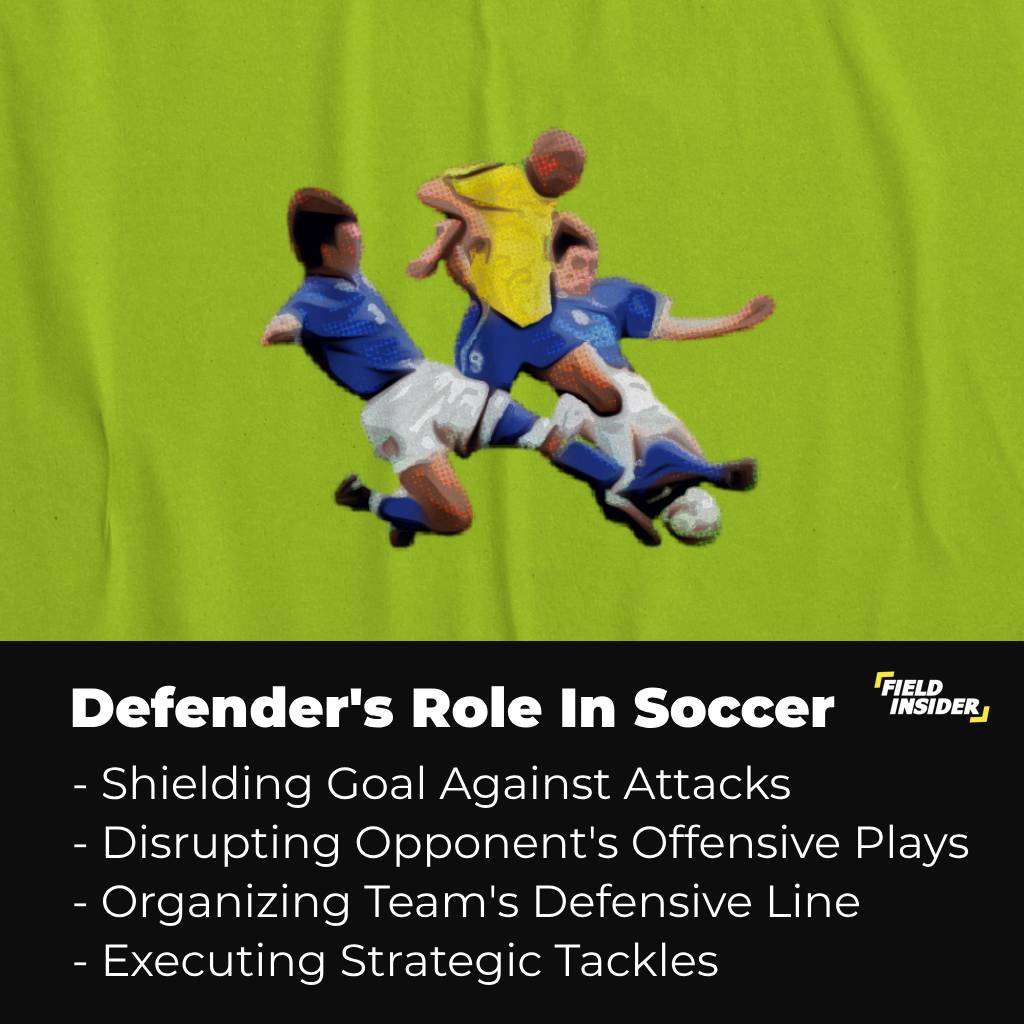
Understanding the Defender’s Role in Soccer
In soccer, the defender’s role is pivotal in shaping the game’s outcome. They are the base of the team’s defense strategy, tasked with frustrating the opposing team’s attacks and initiating counterattacks.
Their role, encompassing tactical awareness and physical prowess, is critical in maintaining the team’s balance. The role of a defender varies with the team’s formation, requiring adaptability and in-depth understanding of different playing styles.
Significance Across Sports
Defenders hold a place of importance across various sports, each requiring a unique set of skills and attributes.
Whether it’s the physicality required in rugby or the tactical understanding in soccer, their contribution to the team’s success is undeniable. Recognizing the universal significance of defenders underscores their value in team sports and highlights the diverse skills they must possess.
Key Attributes of a Successful Defender
Successful defenders in soccer display a combination of physical strength, agility, tactical intelligence, and mental toughness.
Their ability to anticipate the opponent’s moves, maintain strong positioning, and execute precise tackles is essential. Developing these skills is a journey, one that requires dedication and constant learning.
Legendary Defenders in Football History and Their Achievements
The table highlights a group of football’s most distinguished defenders, each renowned for their contributions to the sport. Franco Baresi and Paolo Maldini are celebrated for their defining roles in AC Milan’s golden era.
Franz Beckenbauer, known as “Der Kaiser,” revolutionized the role of the sweeper with his elegance and leadership. Englishman Bobby Moore is remembered for his impeccable defending and captaining England to World Cup glory.
Alessandro Nesta and Carles Puyol, both masters of the defensive art, are revered for their consistency and leadership at the highest levels of club and international football.
| Defender Name | Notable Achievements |
|---|---|
| Franco Baresi | 3 UEFA Champions League titles, 6 Serie A titles |
| Paolo Maldini | 5 UEFA Champions League titles, 7 Serie A titles |
| Franz Beckenbauer | 2 Ballon d’Or, 3 European Cups, FIFA World Cup (1974) |
| Bobby Moore | FIFA World Cup (1966), West Ham United legend |
| Alessandro Nesta | 2 UEFA Champions League titles, 3 Serie A titles |
| Carles Puyol | UEFA Euro (2008), FIFA World Cup (2010), 3 UCL titles |
| Marcel Desailly | FIFA World Cup (1998), 2 UEFA Champions League titles |
| Sergio Ramos | FIFA World Cup (2010), 2 UEFA Euros, 4 UCL titles |
| Daniel Passarella | FIFA World Cup (1978), Copa Libertadores (1986) |
| Roberto Carlos | FIFA World Cup (2002), 3 UEFA Champions League titles |
Marcel Desailly, a versatile and physically imposing defender, achieved significant success both in club and international football. Sergio Ramos, known for his aggressive style and goal-scoring prowess, has been a key figure in Spain’s golden generation.
Daniel Passarella, an Argentine icon, combined tough defending with leadership and aerial ability. Finally, Roberto Carlos, famous for his physicality and attacking flair, redefined the role of a left-back with his unique skills.
These players have left an indelible mark on football, remembered for their skill, leadership, and contributions to their teams’ successes.
Preparation
Physical and Mental Attributes
The foundation of a good defender lies in their physical and mental attributes. Physical attributes like strength, speed, and endurance are vital, but they must be coupled with mental resilience.
A defender must possess the mental fortitude to make split-second decisions under pressure, demonstrating a blend of physical readiness and strategic thinking.
Importance of a Strong Defensive Mindset
A strong defensive mindset is crucial for success in this role. It involves strategic planning, patience, and the ability to read the game effectively.
This mindset is not inborn but developed through experience and a deep understanding of the sport’s nuances, as highlighted in training-focused articles such as football training.
Training Routines for Defensive Skills
Effective training routines are essential in developing a defender’s skill set. These routines should focus on enhancing key defensive skills such as agility, tackling precision, and spatial awareness.
Regularly engaging in targeted exercises and drills using specialized football training equipment can lead to significant improvements in defensive capabilities.
Choosing Your Sport
Exploring Sports with Defenders
Choosing the right sport is a crucial decision for aspiring defenders. Different sports offer varied roles for defenders, each with unique challenges and requirements.
From the strategic positioning in soccer to the physical confrontations in rugby, understanding these differences helps in making an informed choice.
Defensive Roles Across Sports
In soccer, a defender’s role can greatly vary depending on the team’s chosen formation, whether it’s a 4-4-2 or a more fluid 3-4-3.
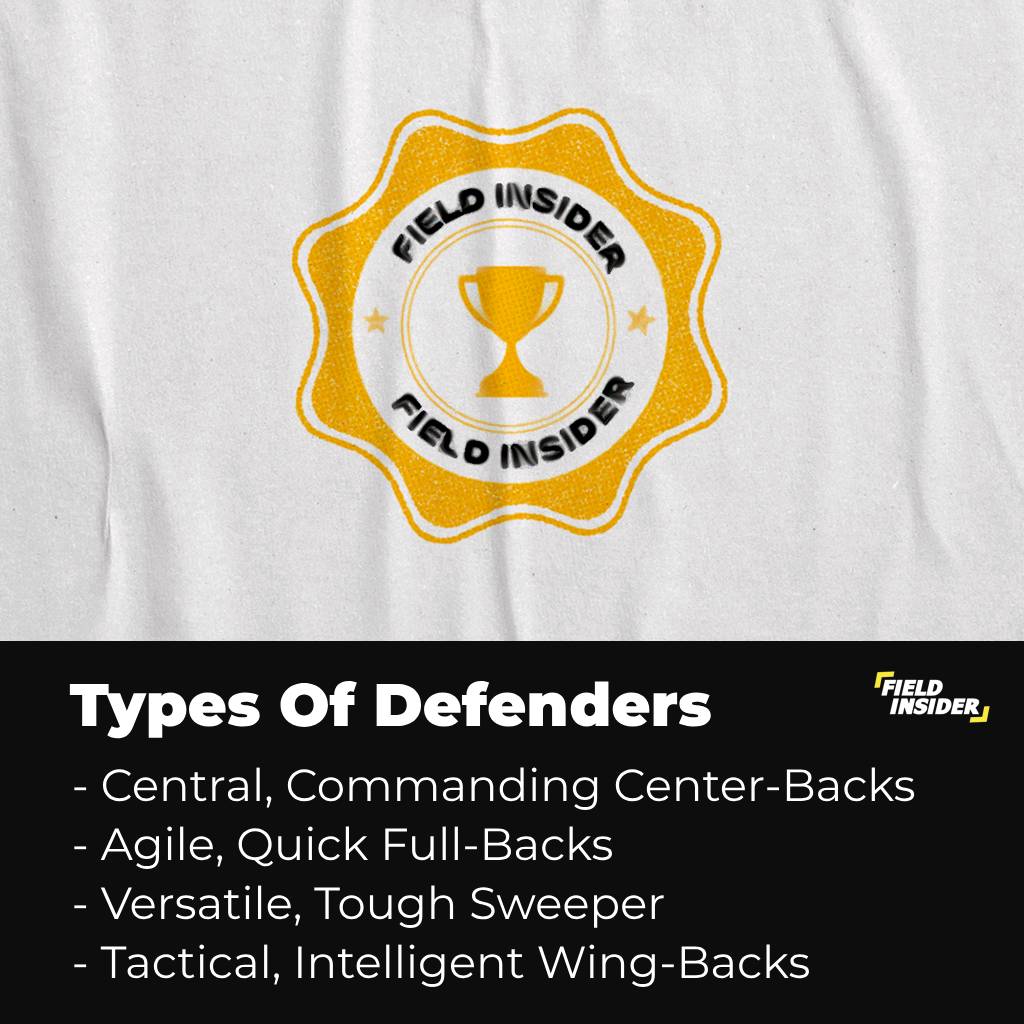
These roles range from central defenders, who focus on intercepting passes and marking attackers, to full-backs, who blend defensive duties with supporting the attack. Each role demands specific skills and a deep understanding of the game.
Tips for Selecting the Right Sport
Selecting the right sport for a defender involves assessing personal strengths, skills, and interests. It’s important to consider one’s physical attributes and adaptability to various defensive roles.
Aspiring defenders should explore and understand the defensive dynamics in different sports and formations to find the one that aligns with their skills and passion.
Skills and Techniques
Mastering Basic Defensive Skills
For a defender, mastering the basics such as tackling, marking, and positioning is just the beginning.
These skills are crucial in every match, forming the foundation of effective defense. Developing these skills requires focused practice and a deep understanding of defensive principles.
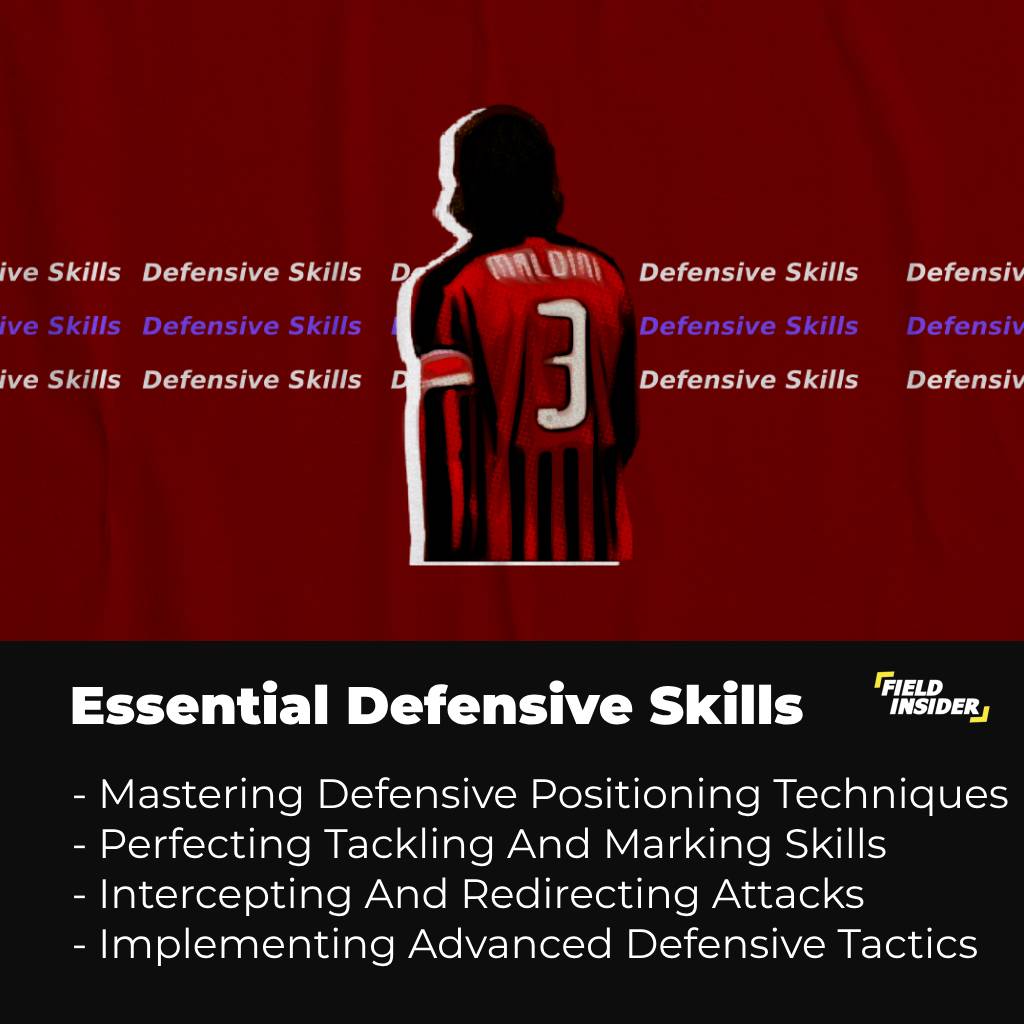
Positioning and Tackling Techniques
Effective positioning is a skill that sets apart great defenders. It involves being in the right place at the right time to intercept or clear the ball.
Coupled with this is the art of tackling, which must be precise and timed to avoid fouls. Perfecting these techniques requires not only physical training but also a strategic understanding of the game, as seen in advanced defensive formations.
Advanced Defensive Strategies
Beyond basic skills, advanced defensive strategies such as understanding different formations, zonal marking, and adapting to various playing styles are essential for a defender aspiring to reach higher levels.
These advanced tactics require not only physical ability but also a deep tactical understanding of the game, which can be honed by studying various team formations and their defensive implications.
Types of Decision-Making Process During Defensive Stages
Four international level male football players from a professional football team in the French first league participated voluntarily in the study conducted by the Gilles Kermarrec and Cyril Bossard to know about the decision making process during defensive stages.
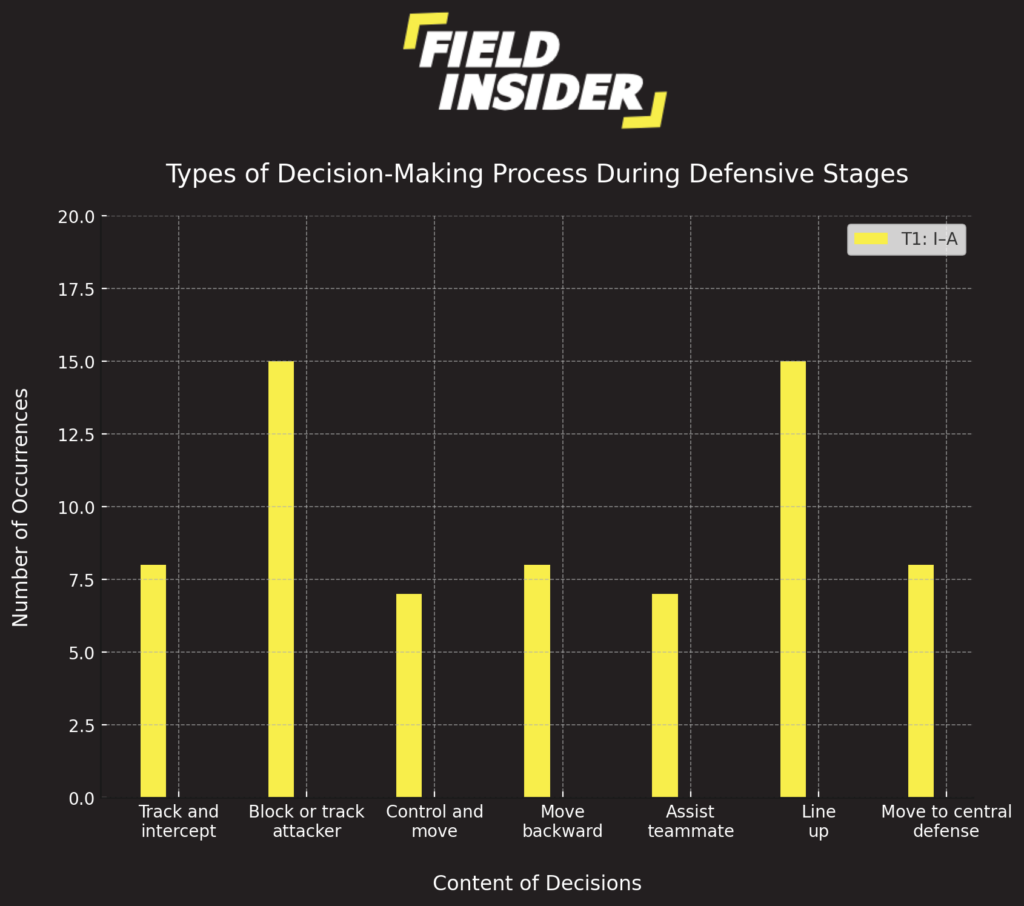
The graph titled “Types of Decision-Making Process During Defensive Stages” visually presents the following numerical information:
Track and Intercept:
- The number of occurrences for the decision-making process ‘T1: I–A’ during the ‘Track and Intercept’ activity is 8.
Block or Track Attacker:
- For ‘Block or Track Attacker’, the number of occurrences for ‘T1: I–A’ is notably higher, recorded at 15.
Control and Move:
- The ‘Control and Move’ activity shows a total of 7 occurrences for the ‘T1: I–A’ process.
Move Backward:
- In the ‘Move Backward’ category, the occurrences for ‘T1: I–A’ are 8, similar to ‘Track and Intercept’.
Assist Teammate:
- The ‘Assist Teammate’ decision-making process ‘T1: I–A’ records 7 occurrences.
Line Up:
A significant increase is seen in ‘Line Up’, where ‘T1: I–A’ has 15 occurrences, tying with ‘Block or Track Attacker’ for the highest count.
Move to Central Defense:
- For ‘Move to Central Defense’, the occurrences of ‘T1: I–A’ are relatively lower, at 8.
The graph effectively captures the frequency of different decision-making processes across various defensive activities in a sporting context, with ‘Block or Track Attacker’ and ‘Line Up’ showing notably higher frequencies for the ‘T1: I–A’ decision-making process.
Career Building
Progressing from Amateur to Professional
Transitioning from an amateur to a professional defender is a challenging journey that requires more than just skill development.
It involves gaining experience in competitive matches, understanding the nuances of professional play, and continuously adapting to higher levels of the game. Aspiring defenders should seek opportunities in competitive soccer to test and improve their skills.
Importance of Continuous Improvement
In the fast-evolving world of soccer, continuous improvement is key to a successful career. This means staying alert of the latest defensive techniques, maintaining peak physical condition, and adapting to new tactical approaches.
A commitment to lifelong learning and adaptability is crucial for anyone aiming to excel as a defender.
Overcoming Challenges in a Defender’s Career
A career in soccer, especially as a defender, is fraught with challenges, from the physical demands of the game to the mental pressure of high-stakes situations.
Developing coping strategies for dealing with setbacks, such as injuries or performance slumps, is crucial. This resilience is what often differentiates successful professionals from the rest, as outlined in guides like becoming a professional football player.
Well-being Off the Field
Mental and Emotional Challenges of Defenders
Defenders often face immense mental and emotional pressures, arising from the high expectations and intense nature of the game.
Managing this stress and maintaining focus are critical for a defender’s long-term success and well-being. Recognizing and addressing these challenges is as important as physical training.
Maintaining Work-Life Balance
Achieving a balance between the demanding world of professional soccer and personal life is crucial for mental health and sustained performance. This balance helps in managing stress, preventing burnout, and maintaining a positive outlook, both on and off the field.
Building Resilience and Mental Toughness
Mental toughness and resilience are critical attributes for defenders. They help in dealing with the ups and downs of a soccer career, including handling criticism, recovering from mistakes, and staying motivated.
Developing these qualities is essential for a long and successful career in soccer, requiring a focus on mental as well as physical health.
Conclusion
To become a successful defender, one must embrace the role’s physical and mental demands, continuously hone their skills, and adapt to the evolving dynamics of their chosen sport.
This guide has provided a roadmap for aspiring defenders, emphasizing the importance of both on-field excellence and off-field well-being.


